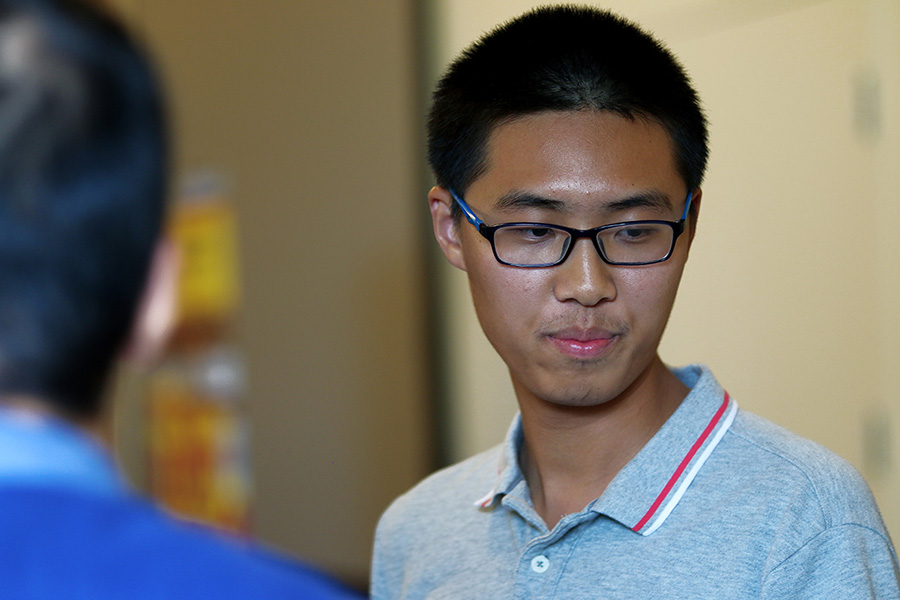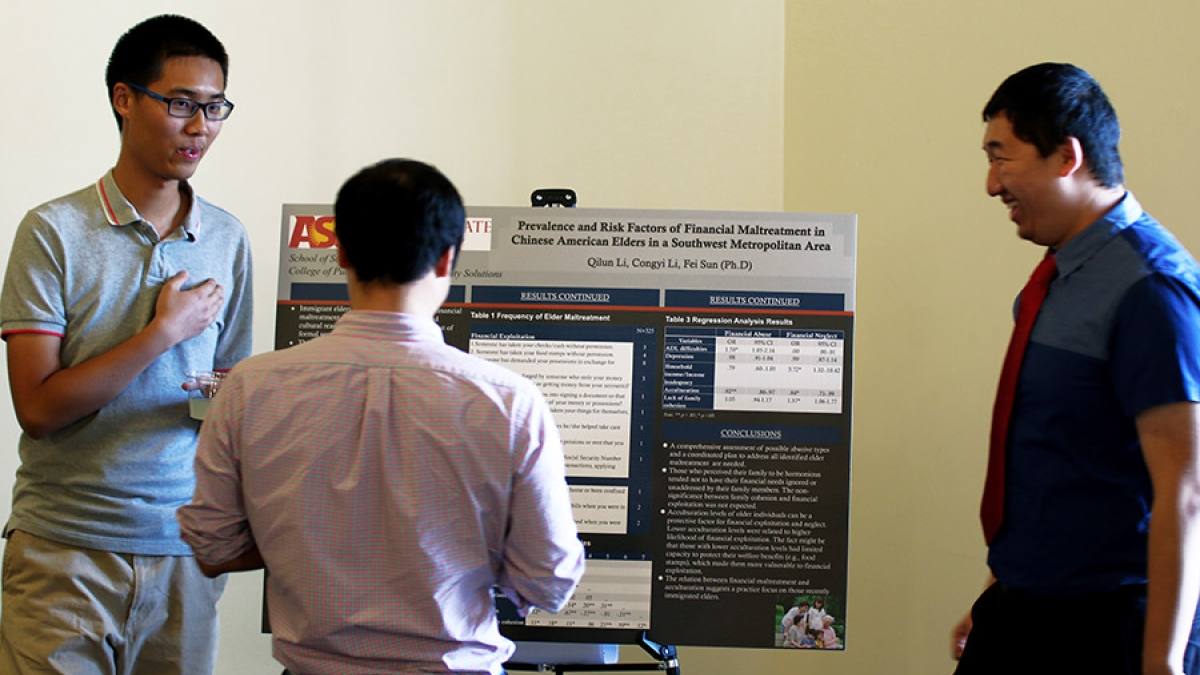The titles of these research projects read as if they are from a professor’s resume:
• "Assessing Police Dangerousness: A Four-Decade Analysis of Law Enforcement Officer Deaths in the United States"
• "The Use of Social Media by Convention and Visitors Bureaus in the Phoenix Metropolitan Area"
• "Attitudes Toward Wilderness: A Comparison Study Amongst Student Groups"
• " Prevalence and Risk Factors of Financial Maltreatment in Chinese-American Elders in a Southwest Metropolitan Area"
But this was research conducted by undergraduate students and presented at the College of Public Service and Community Solutions 2016 Undergraduate Research Symposium. Professors from the college’s four schools guided the students on their projects.
Two undergraduate students from different schools teamed up to investigate the financial exploitation of elderly Chinese-Americans. Qilun Li is a social work major. Congy Li (no relation) is a tourism development and management major in the School of Community Resources and Development. They interviewed 325 Chinese-Americans over the age of 60 and found almost 10 percent reported at least some form of financial exploitation.
“Immigrant elders may be more vulnerable to financial maltreatment due to specific historical and cultural reasons such as lack of access to or trust of formal services,” said Congy Li.

Tourism development and management major Congy Yi and his research partner interviewed hundreds of Chinese-American elderly to learn about potential financial exploitation.
Li said conducting undergraduate research improved his leadership skills and boosted his confidence. It also encouraged him to give back. He plans to volunteer, helping Chinese-American elderly who were born in China to acculturate and learn English.
“Those are little and simple things, but can make a big difference to those in need as time goes by,” Li said.
Li and his teammate were guided in their research by Fei Sun, an associate professor in the School of Social Work whose research focuses on aging-related issues. Amanda Andrew, coordinator of the College’s Student Success Initiatives, said professors play an important role in undergraduate research projects.
“This would not be possible without our faculty who truly want to work with students,” said Andrews. “They help bring students from a basic understanding of research to an applied understanding of research and guide them every step of the way.”
Criminology and criminal justice professor Michael White is working with a team of five students on a research project analyzing police officer deaths in the United States. Students are entering data from the Officer Down Memorial Page website to document every police officer killed in the United States from 1970 to 2015.
Students take note of the rank, type of police agency, state, age, gender, experience and whether their death was from a firearm, traffic collision or other type of fatality. The work is taking hundreds of hours to complete, but it is something criminal justice major Jonathan Hernandez is proud to be a part of.
“I take the time to read every story and fill out each questionnaire,” said Hernandez. “I try to give care. This is somebody’s family member. And I really respect that.”

For Hernandez, the painstaking work is meaningful in another way. He’s learning about the process of research.
“It’s time-consuming and tedious,” Hernandez said, “but it has to get done, so that’s what I learned. And I like it now, honestly.”
Tiffany Marcum can attest to the hard work that goes into such a research project. Marcum, a social work and criminology and criminal justice major, partnered with public service and public policy major Emily Barney last year on a research project analyzing prison data. They sought to measure the difference in stress and depression experienced by men and women in Arizona prisons.
“This has really helped me to figure out what I want to do, whether it’s research-based or whatnot and just to get involved with the academic side of my experience,” said Marcum.
Marcum and Barney are working to get their research published in a criminology-related journal. They are also scheduled to present their findings at an annual criminology conference early next year.
“It’s providing a lot of opportunities for us that we just wouldn’t have received if we did not participate in this,” noted Marcum.
The criminology and criminal justice professor they worked with, Kevin Wright, says collaborating with undergraduate students benefitted his research as well.
“The program provides a refreshing reminder that there are students who want to learn and challenge themselves for reasons beyond simply earning a good grade,” said Wright. “I found the students' enthusiasm to be contagious, and it motivated me to get my own work done.”
Renee Sanders credits her undergraduate research project for helping her land a spot in a prestigious conservation leadership graduate program at Colorado State University.

Community resources and development senior Renee Sanders surveyed students about their attitudes on wilderness.
Sanders, a senior in the School of Community Resources and Development, surveyed students to learn more about their attitudes on wilderness areas.
“My research with wilderness is definitely something I’m proud of,” said Sanders. “What I’ve noticed when looking at the research is that they care about wilderness, but they might not end up spending time there.”
More University news

Year in review: ASU's top stories for 2024
As the year draws to a close, ASU News is revisiting some of the university's biggest stories in 2024 — from big announcements to…

ASU earns 'Gold' in inaugural Times Higher Education Online Learning Ranking
Arizona State University continues to set the standard in online learning, having earned a Gold rating in the inaugural Times…
2024 President's Awards honor ASU projects for real-world impact
Ten Arizona State University programs were honored for their real-world solutions during the annual President’s Awards ceremony…
